Organisational Culture at Marriott International: A Detailed Report
VerifiedAdded on 2020/10/23
|6
|1250
|224
Report
AI Summary
This report examines the organisational culture of Marriott International, a multinational hospitality company. It begins with an introduction to organisational culture and its impact on business goals, followed by an overview of Marriott International and its 'Serve' culture. The report identifies challenges faced by Marriott, such as understanding the role of culture in human resource development, employee retention, and the implementation of employee-friendly policies. It then discusses the changes implemented by the company, including a focus on fair treatment, training, and development. The report applies Handy's culture theory, analyzing power, role, task, and person cultures in the context of Marriott. It recommends the adoption of a task culture, highlighting its benefits, such as rapid response and improved efficiency. The report concludes by emphasizing the crucial role of organisational culture in achieving long-term success and motivating team members.
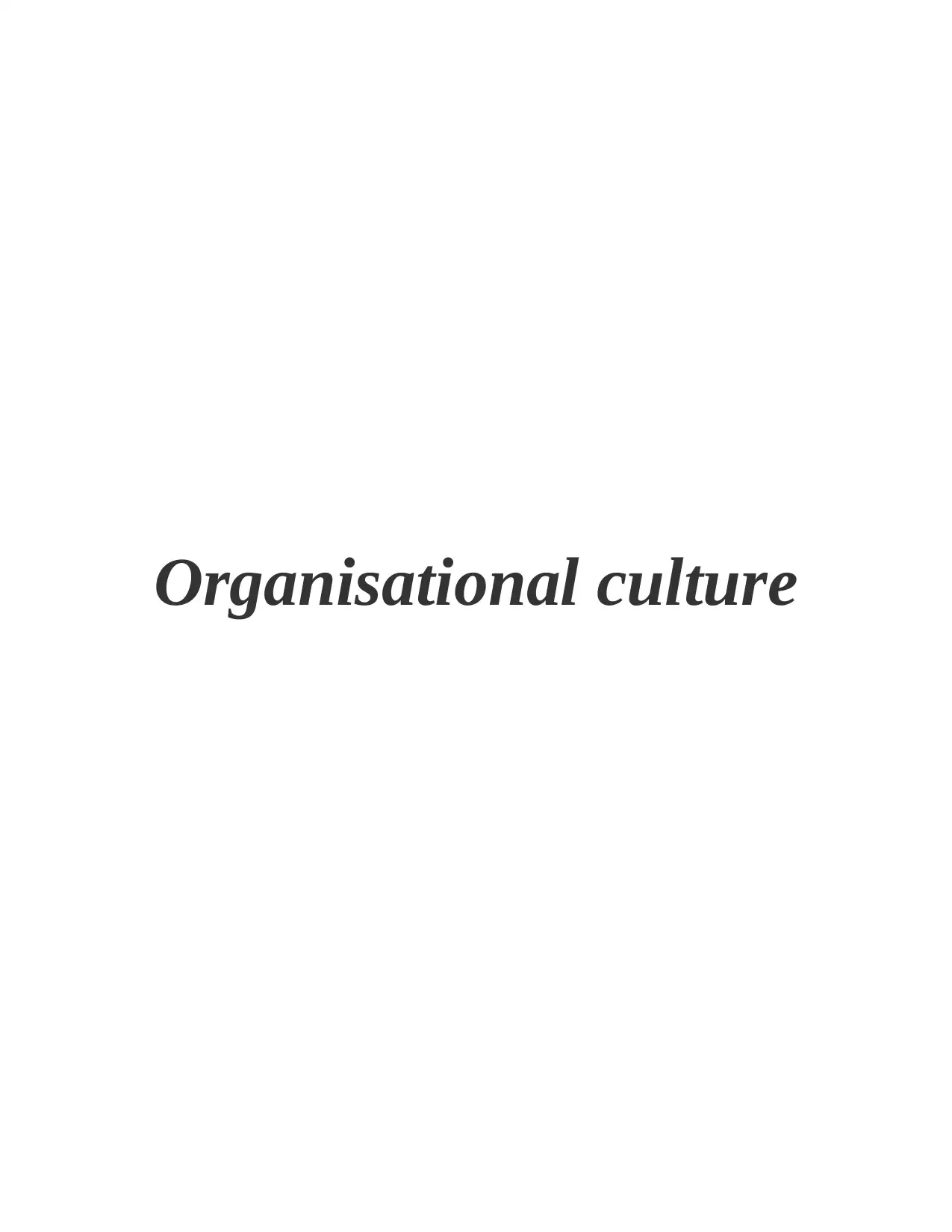
Organisational culture
Paraphrase This Document
Need a fresh take? Get an instant paraphrase of this document with our AI Paraphraser
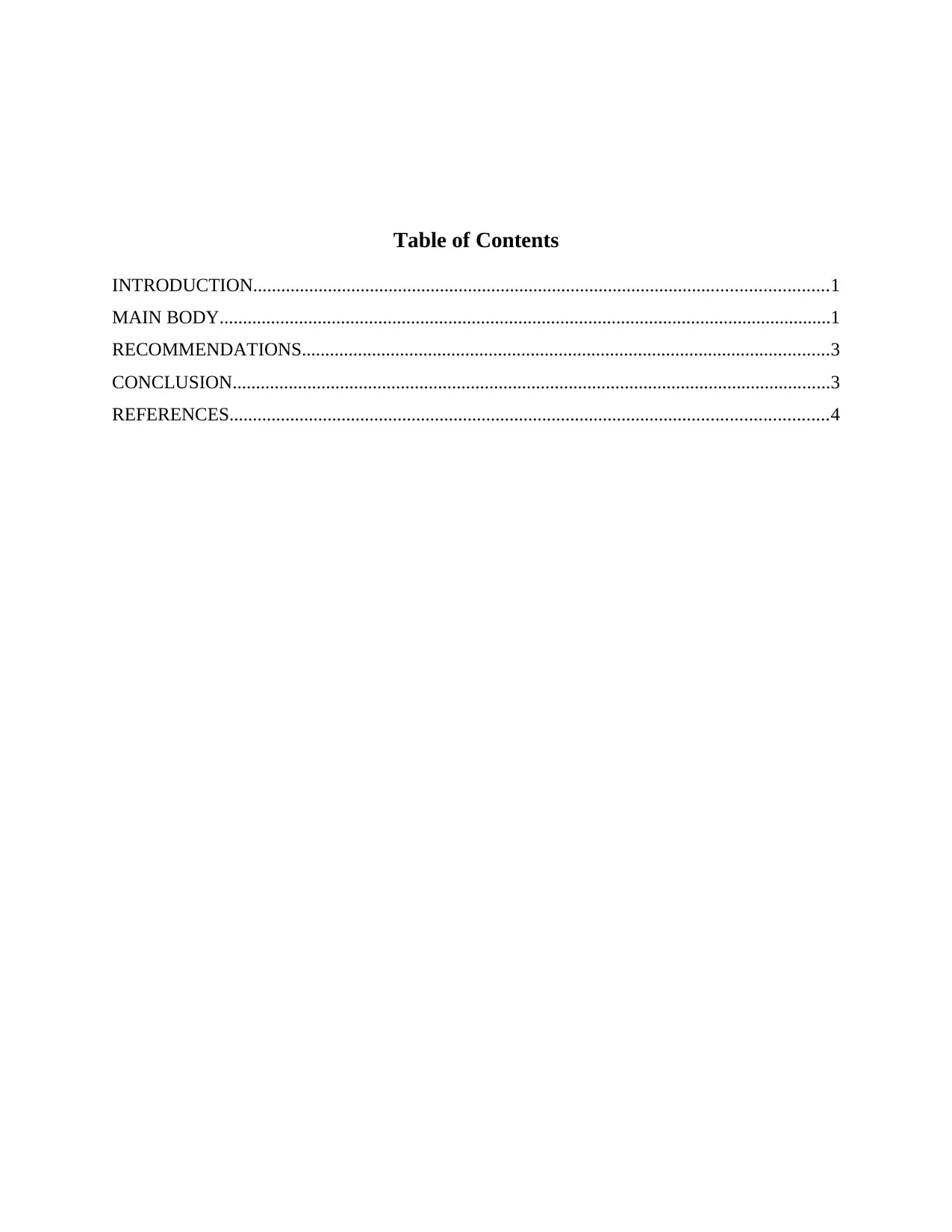
Table of Contents
INTRODUCTION...........................................................................................................................1
MAIN BODY...................................................................................................................................1
RECOMMENDATIONS.................................................................................................................3
CONCLUSION................................................................................................................................3
REFERENCES................................................................................................................................4
INTRODUCTION...........................................................................................................................1
MAIN BODY...................................................................................................................................1
RECOMMENDATIONS.................................................................................................................3
CONCLUSION................................................................................................................................3
REFERENCES................................................................................................................................4
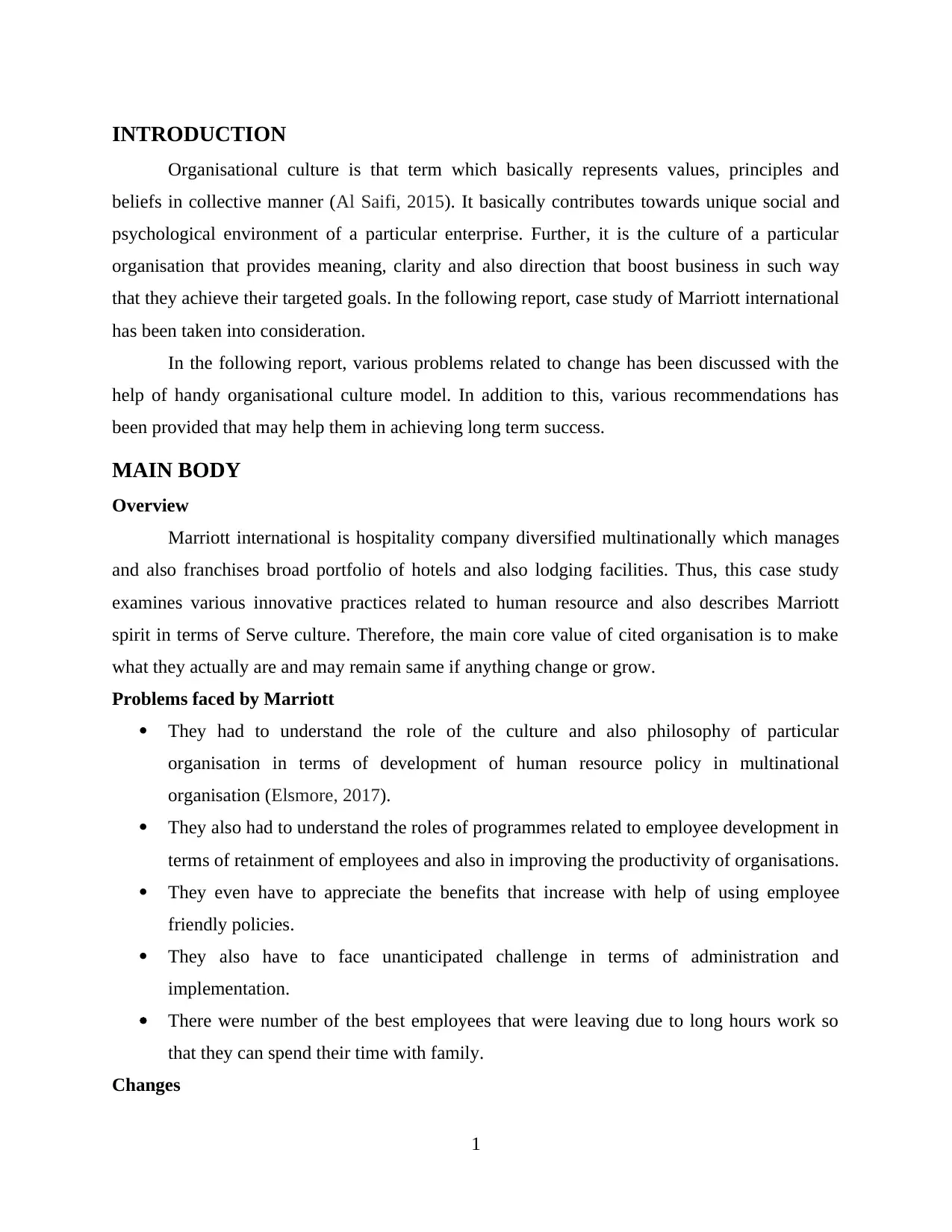
INTRODUCTION
Organisational culture is that term which basically represents values, principles and
beliefs in collective manner (Al Saifi, 2015). It basically contributes towards unique social and
psychological environment of a particular enterprise. Further, it is the culture of a particular
organisation that provides meaning, clarity and also direction that boost business in such way
that they achieve their targeted goals. In the following report, case study of Marriott international
has been taken into consideration.
In the following report, various problems related to change has been discussed with the
help of handy organisational culture model. In addition to this, various recommendations has
been provided that may help them in achieving long term success.
MAIN BODY
Overview
Marriott international is hospitality company diversified multinationally which manages
and also franchises broad portfolio of hotels and also lodging facilities. Thus, this case study
examines various innovative practices related to human resource and also describes Marriott
spirit in terms of Serve culture. Therefore, the main core value of cited organisation is to make
what they actually are and may remain same if anything change or grow.
Problems faced by Marriott
They had to understand the role of the culture and also philosophy of particular
organisation in terms of development of human resource policy in multinational
organisation (Elsmore, 2017).
They also had to understand the roles of programmes related to employee development in
terms of retainment of employees and also in improving the productivity of organisations.
They even have to appreciate the benefits that increase with help of using employee
friendly policies.
They also have to face unanticipated challenge in terms of administration and
implementation.
There were number of the best employees that were leaving due to long hours work so
that they can spend their time with family.
Changes
1
Organisational culture is that term which basically represents values, principles and
beliefs in collective manner (Al Saifi, 2015). It basically contributes towards unique social and
psychological environment of a particular enterprise. Further, it is the culture of a particular
organisation that provides meaning, clarity and also direction that boost business in such way
that they achieve their targeted goals. In the following report, case study of Marriott international
has been taken into consideration.
In the following report, various problems related to change has been discussed with the
help of handy organisational culture model. In addition to this, various recommendations has
been provided that may help them in achieving long term success.
MAIN BODY
Overview
Marriott international is hospitality company diversified multinationally which manages
and also franchises broad portfolio of hotels and also lodging facilities. Thus, this case study
examines various innovative practices related to human resource and also describes Marriott
spirit in terms of Serve culture. Therefore, the main core value of cited organisation is to make
what they actually are and may remain same if anything change or grow.
Problems faced by Marriott
They had to understand the role of the culture and also philosophy of particular
organisation in terms of development of human resource policy in multinational
organisation (Elsmore, 2017).
They also had to understand the roles of programmes related to employee development in
terms of retainment of employees and also in improving the productivity of organisations.
They even have to appreciate the benefits that increase with help of using employee
friendly policies.
They also have to face unanticipated challenge in terms of administration and
implementation.
There were number of the best employees that were leaving due to long hours work so
that they can spend their time with family.
Changes
1
⊘ This is a preview!⊘
Do you want full access?
Subscribe today to unlock all pages.

Trusted by 1+ million students worldwide
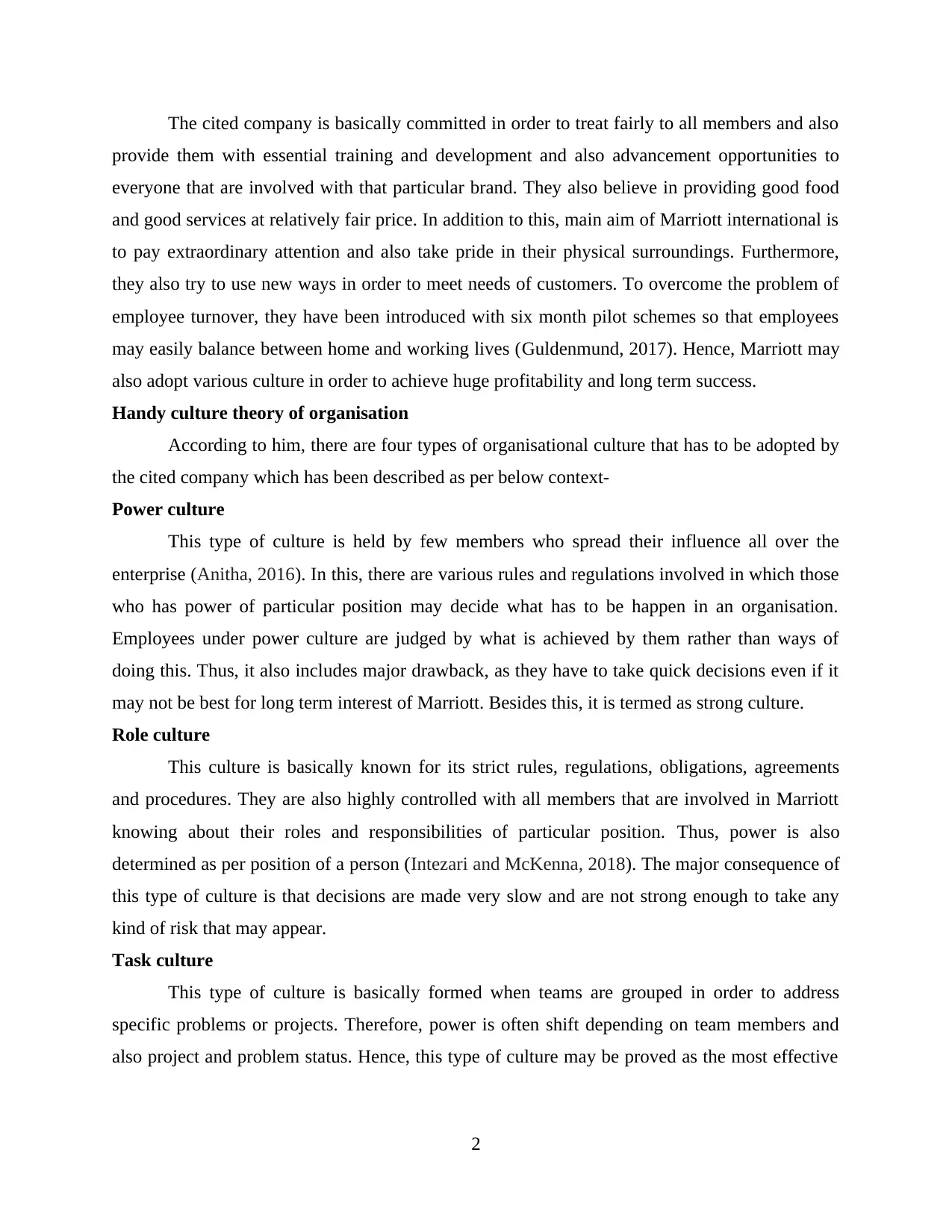
The cited company is basically committed in order to treat fairly to all members and also
provide them with essential training and development and also advancement opportunities to
everyone that are involved with that particular brand. They also believe in providing good food
and good services at relatively fair price. In addition to this, main aim of Marriott international is
to pay extraordinary attention and also take pride in their physical surroundings. Furthermore,
they also try to use new ways in order to meet needs of customers. To overcome the problem of
employee turnover, they have been introduced with six month pilot schemes so that employees
may easily balance between home and working lives (Guldenmund, 2017). Hence, Marriott may
also adopt various culture in order to achieve huge profitability and long term success.
Handy culture theory of organisation
According to him, there are four types of organisational culture that has to be adopted by
the cited company which has been described as per below context-
Power culture
This type of culture is held by few members who spread their influence all over the
enterprise (Anitha, 2016). In this, there are various rules and regulations involved in which those
who has power of particular position may decide what has to be happen in an organisation.
Employees under power culture are judged by what is achieved by them rather than ways of
doing this. Thus, it also includes major drawback, as they have to take quick decisions even if it
may not be best for long term interest of Marriott. Besides this, it is termed as strong culture.
Role culture
This culture is basically known for its strict rules, regulations, obligations, agreements
and procedures. They are also highly controlled with all members that are involved in Marriott
knowing about their roles and responsibilities of particular position. Thus, power is also
determined as per position of a person (Intezari and McKenna, 2018). The major consequence of
this type of culture is that decisions are made very slow and are not strong enough to take any
kind of risk that may appear.
Task culture
This type of culture is basically formed when teams are grouped in order to address
specific problems or projects. Therefore, power is often shift depending on team members and
also project and problem status. Hence, this type of culture may be proved as the most effective
2
provide them with essential training and development and also advancement opportunities to
everyone that are involved with that particular brand. They also believe in providing good food
and good services at relatively fair price. In addition to this, main aim of Marriott international is
to pay extraordinary attention and also take pride in their physical surroundings. Furthermore,
they also try to use new ways in order to meet needs of customers. To overcome the problem of
employee turnover, they have been introduced with six month pilot schemes so that employees
may easily balance between home and working lives (Guldenmund, 2017). Hence, Marriott may
also adopt various culture in order to achieve huge profitability and long term success.
Handy culture theory of organisation
According to him, there are four types of organisational culture that has to be adopted by
the cited company which has been described as per below context-
Power culture
This type of culture is held by few members who spread their influence all over the
enterprise (Anitha, 2016). In this, there are various rules and regulations involved in which those
who has power of particular position may decide what has to be happen in an organisation.
Employees under power culture are judged by what is achieved by them rather than ways of
doing this. Thus, it also includes major drawback, as they have to take quick decisions even if it
may not be best for long term interest of Marriott. Besides this, it is termed as strong culture.
Role culture
This culture is basically known for its strict rules, regulations, obligations, agreements
and procedures. They are also highly controlled with all members that are involved in Marriott
knowing about their roles and responsibilities of particular position. Thus, power is also
determined as per position of a person (Intezari and McKenna, 2018). The major consequence of
this type of culture is that decisions are made very slow and are not strong enough to take any
kind of risk that may appear.
Task culture
This type of culture is basically formed when teams are grouped in order to address
specific problems or projects. Therefore, power is often shift depending on team members and
also project and problem status. Hence, this type of culture may be proved as the most effective
2
Paraphrase This Document
Need a fresh take? Get an instant paraphrase of this document with our AI Paraphraser
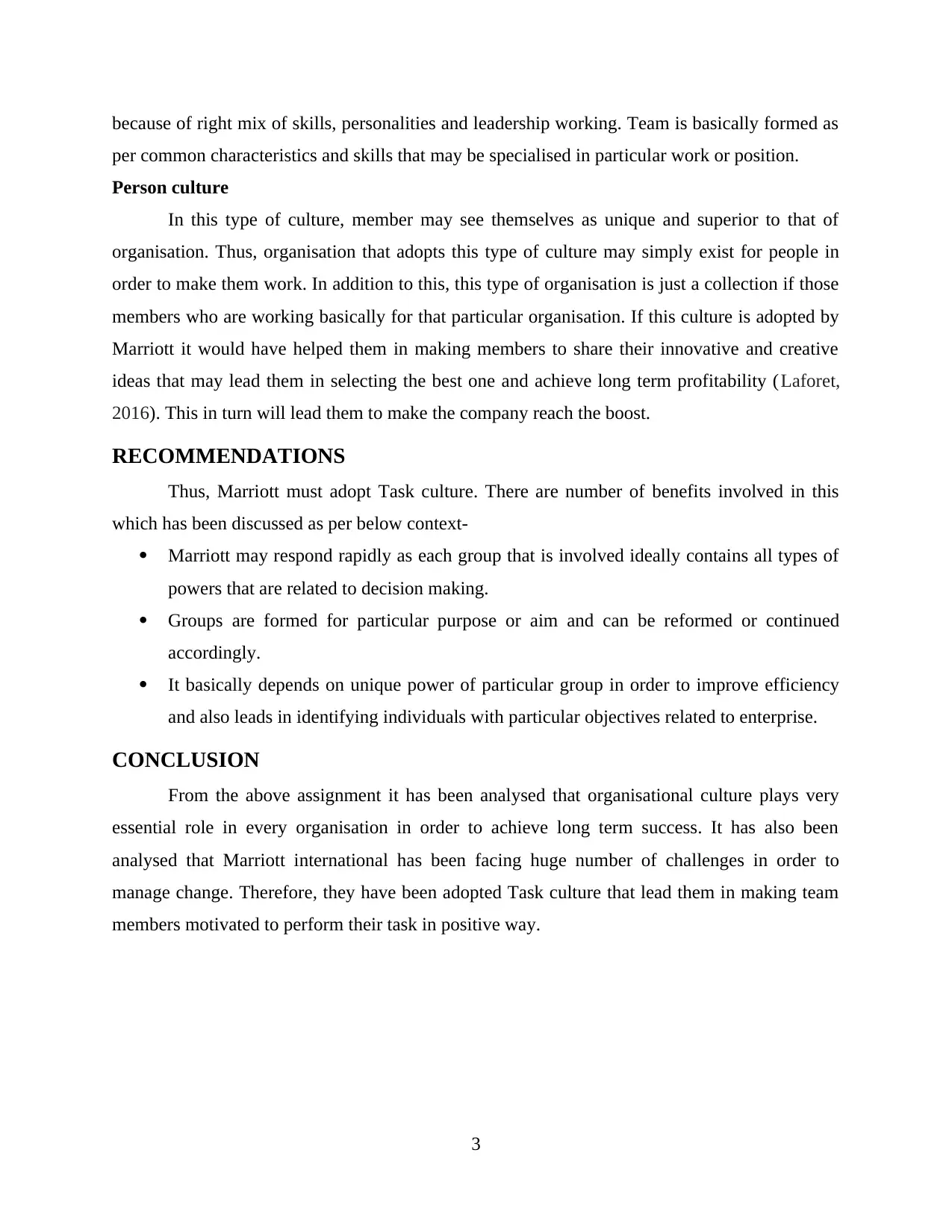
because of right mix of skills, personalities and leadership working. Team is basically formed as
per common characteristics and skills that may be specialised in particular work or position.
Person culture
In this type of culture, member may see themselves as unique and superior to that of
organisation. Thus, organisation that adopts this type of culture may simply exist for people in
order to make them work. In addition to this, this type of organisation is just a collection if those
members who are working basically for that particular organisation. If this culture is adopted by
Marriott it would have helped them in making members to share their innovative and creative
ideas that may lead them in selecting the best one and achieve long term profitability (Laforet,
2016). This in turn will lead them to make the company reach the boost.
RECOMMENDATIONS
Thus, Marriott must adopt Task culture. There are number of benefits involved in this
which has been discussed as per below context-
Marriott may respond rapidly as each group that is involved ideally contains all types of
powers that are related to decision making.
Groups are formed for particular purpose or aim and can be reformed or continued
accordingly.
It basically depends on unique power of particular group in order to improve efficiency
and also leads in identifying individuals with particular objectives related to enterprise.
CONCLUSION
From the above assignment it has been analysed that organisational culture plays very
essential role in every organisation in order to achieve long term success. It has also been
analysed that Marriott international has been facing huge number of challenges in order to
manage change. Therefore, they have been adopted Task culture that lead them in making team
members motivated to perform their task in positive way.
3
per common characteristics and skills that may be specialised in particular work or position.
Person culture
In this type of culture, member may see themselves as unique and superior to that of
organisation. Thus, organisation that adopts this type of culture may simply exist for people in
order to make them work. In addition to this, this type of organisation is just a collection if those
members who are working basically for that particular organisation. If this culture is adopted by
Marriott it would have helped them in making members to share their innovative and creative
ideas that may lead them in selecting the best one and achieve long term profitability (Laforet,
2016). This in turn will lead them to make the company reach the boost.
RECOMMENDATIONS
Thus, Marriott must adopt Task culture. There are number of benefits involved in this
which has been discussed as per below context-
Marriott may respond rapidly as each group that is involved ideally contains all types of
powers that are related to decision making.
Groups are formed for particular purpose or aim and can be reformed or continued
accordingly.
It basically depends on unique power of particular group in order to improve efficiency
and also leads in identifying individuals with particular objectives related to enterprise.
CONCLUSION
From the above assignment it has been analysed that organisational culture plays very
essential role in every organisation in order to achieve long term success. It has also been
analysed that Marriott international has been facing huge number of challenges in order to
manage change. Therefore, they have been adopted Task culture that lead them in making team
members motivated to perform their task in positive way.
3
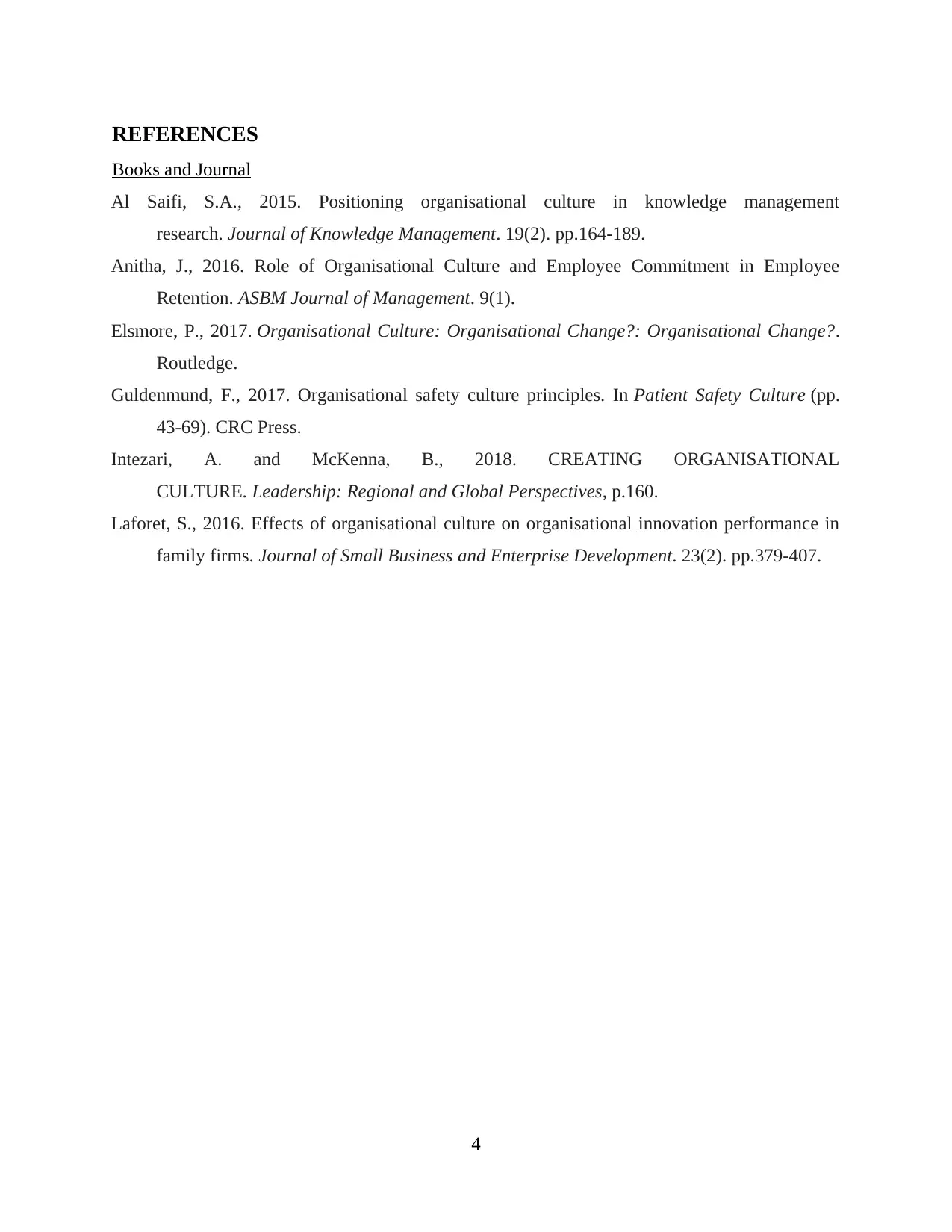
REFERENCES
Books and Journal
Al Saifi, S.A., 2015. Positioning organisational culture in knowledge management
research. Journal of Knowledge Management. 19(2). pp.164-189.
Anitha, J., 2016. Role of Organisational Culture and Employee Commitment in Employee
Retention. ASBM Journal of Management. 9(1).
Elsmore, P., 2017. Organisational Culture: Organisational Change?: Organisational Change?.
Routledge.
Guldenmund, F., 2017. Organisational safety culture principles. In Patient Safety Culture (pp.
43-69). CRC Press.
Intezari, A. and McKenna, B., 2018. CREATING ORGANISATIONAL
CULTURE. Leadership: Regional and Global Perspectives, p.160.
Laforet, S., 2016. Effects of organisational culture on organisational innovation performance in
family firms. Journal of Small Business and Enterprise Development. 23(2). pp.379-407.
4
Books and Journal
Al Saifi, S.A., 2015. Positioning organisational culture in knowledge management
research. Journal of Knowledge Management. 19(2). pp.164-189.
Anitha, J., 2016. Role of Organisational Culture and Employee Commitment in Employee
Retention. ASBM Journal of Management. 9(1).
Elsmore, P., 2017. Organisational Culture: Organisational Change?: Organisational Change?.
Routledge.
Guldenmund, F., 2017. Organisational safety culture principles. In Patient Safety Culture (pp.
43-69). CRC Press.
Intezari, A. and McKenna, B., 2018. CREATING ORGANISATIONAL
CULTURE. Leadership: Regional and Global Perspectives, p.160.
Laforet, S., 2016. Effects of organisational culture on organisational innovation performance in
family firms. Journal of Small Business and Enterprise Development. 23(2). pp.379-407.
4
⊘ This is a preview!⊘
Do you want full access?
Subscribe today to unlock all pages.

Trusted by 1+ million students worldwide
1 out of 6
Related Documents
Your All-in-One AI-Powered Toolkit for Academic Success.
+13062052269
info@desklib.com
Available 24*7 on WhatsApp / Email
![[object Object]](/_next/static/media/star-bottom.7253800d.svg)
Unlock your academic potential
Copyright © 2020–2025 A2Z Services. All Rights Reserved. Developed and managed by ZUCOL.





